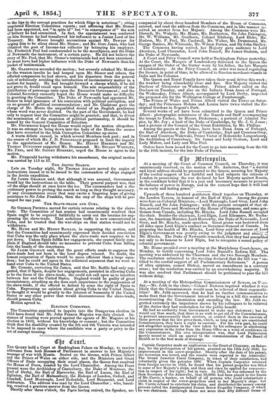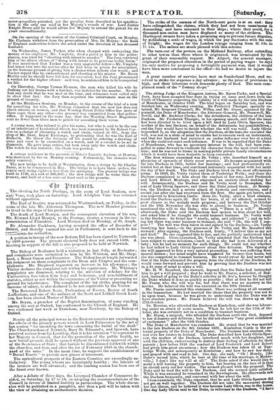4t 311rtropo1io.
At a meeting of the Court of Common Council, on Thursday, it was unanimously resolved, on the motion of Mr. Anderton, that " a dutiful and loyal address should be presented to the Queen, assuring her Majesty of the cordial support of her faithful and loyal subjects the citizens of London in prosecuting the war declared by her Majesty against Russia, in the confident belief that it is a just and necessary measure to preserve the balance of power in Europe, and in the earnest hope that it will lead to an early and lasting peace."
Upwards of three hundred gentlemen dined together on Thursday, at the London Tavern, in honour of the Earl of Elgin. Among the guests were four ex-Colonial Ministers,—Lord Monteagle, Lord Grey, Lord John Russell, and Sir John Pakington ; with the present occupant of that of- fice, several Peers and Members of the House of Commons, and some gen- tlemen from Canada, including Mr. Hincks. Lord John Russell occupied the chair. Besides the chairman, Lord Elgin, Lord Ellesmere, Mr. Bucha- nan, the American Minister, Lord Harrowby, the Duke of Newcastle, Lord Grey, and Mr. Hincks, made speeches. Great praise was bestowed from all sides upon Lord Elgin's conduct as Governor-General of Canada. In proposing the health of Mr. Hincks, Lord Grey said the success of Lord Elgin's Government was greatly owing to the judgment and abi'litj Cf Mr. Hincks. The Duke of Newcastle remarked, that they had assembled not only to do honour to Lord Elgin, but to recognize a sound policy of colonial government.
Mr. Hume presided over a meeting at the Marylebone Court-house, on Monday, to testify concerning Lord John Russell's Reform Bill. The meeting was addressed by the Chairman and the two Borough Members. The resolution submitted to the meeting declared that the bill was "en- titled to the cordial support of all Parliamentary Reformers." A person of ultra opinions, named Dickey, moved an amendment in a contrary sense; but the resolution was carried by an overwhelming majority. It was also resolved that Parliament should be petitioned to pass the bill without delay.
At a meeting of the Metropolitan Commissioners of Sewers, on T..es- day,—Mr. Jebb in the chair,— Colonel Dawson inquired whether it was likely that the Commissioners would soon be relieved of their responsibi- lities? Mr. Jebb answered, that he had no further communication to make than that the Government intend to bring in a bill this session for reconstructing the Commission and amending the law. Mr. Jebb re- gretted extremely the impatience shown by his colleagues to be relieved of the duties they had undertaken for the public benefit. He had no authority from Government to make any statement ; but he would say thus much, that there is no wish to get rid of the Commissioners, to protract unnecessarily their services, or control them in the exercise of those powers that the law gives them, which, as long as they are constituted Commissioners, they have a right to exercise. For his own part, he could not altogether acquiesce in the view taken by his colleagues in attributing any expression in the letter from the Home Office as a want of confidence us the Commissioners. His own interpretation was, that Lord Palmerston merely meant to elicit an answer to the communication of the Board of Health as to the best mode of drainage.
Captain Carpenter made an application to the Court of Chancery, on Ester. day, for the prolongation of his patent, granted on the 13th July 1840, for improvement in the screw-propeller. Shortly after the date of his patent, the invention was tested, and the results were reported to the Admiralty. The Grand Junction Canal Company, in token of their satisfaction, had voluntarily given the patentee 1001. When Captain Carpenter returned from foreign service in 1845, he found that his patent propeller was fitted. to some of her Majesty's ships, and then and since he applied for remunera- tion in respect of his right ; but in vain. In 1852, he was informed by the then Secretary of the Admiralty, that 20,0001. had been placed in the hands of Mr. Currie, a banker, on behalf of all persons who could substantiate a claim in respect of the screw-propellers used in her Majesty's ships : but Mr. Currie refused to entertain his claim, and distributed the money among persons called the Amalgamated Patent Screw Propeller Company, of which he was chairman. Although there are more than fifty different forms of
screw-propellers patented, yet the peculiar form described in his specifica, tints ie the only one used in her Majesty's vessels of war. Lord Justice 'Knight Bruce said he would advise her Majesty to extend the patent for six years unconditionally.
Olo. the opening of the session of the Central Criminal Court, on Monday, Mn. Clarkson withdrew from the prosecution of Mrs. De Molyns: the Bank of England authorities believe she acted under the direction of her deceased husband.
On Wednesday, James Tucker, who when charged with embezzling the money of his employer, Mr. timpleby, fired a pistol at him in the police- station„ was tried for "shooting with intent to murder." The Jury convicted him of the Minor offence of "firing with intent to do oerievous bodily harm.' It was mentioned that Tucker was a very ungrateful fellow—Mr. Umpleby had taken him into his service after he had been in prison for misconduct, on the humane ground of giving him a chancewhen nobody else would ; and Tucker repaid this by embezzlement and shooting at his master. Mr. Baron Martin said he should have left him for execution, had the Jury,pronounced a verdict for the higher offence : relit was, he sentenced him to be transported for life.
On Thursday, George Vernon Heiman, the man who killed his wife by dashing out her brains with a hatchet, was indicted for the murder. No one had any doubt that he was mad at the time, and witnesses were called only to show that fact : the Jury then acquitted the unfortunate man on the ground of insanity.
At the Middlesex Sessions, on Monday, in the course of the trial of a man for assaulting his wife, Mr. Witham remarked that the new law does not check attacks on women, and that Worship Street Police Office has more of these cases than any other—the prisoner was committed from that police- office. It happened on the same day, that the Worship Street Magistrate sent no fewer than three men to prison for assaulting their wives.
A young man, who refused to give his name, but who is said to be the son of an inhabitant of Leadenhall Street, has been remanded by Sir Robert Car- den on a charge of obtaining a watch and chain, valued at 61/., from the shop of Mr. Dent, Royal Exchange, by pretending that he was the Earl of Da&eith. He threw the foreman off his guard by ordering a drawing of arms and crest to be enamelled on a watch, and of a coronet to be set in diamonds. He gave large orders, but took away only the watch and chain. The watch he has restored; the chain was pawned.
A cottage residence in the grounds of Miles's Lunatic Asylum, at Heaton, was destroyed by fire on Monday evening. Fortunately, the inmates were safely removed.
The new bridge to be built at Westminster, from a design by Sir Charles Barry, is to be commenced in May. The bridge is to have three arches, the centre arch rising eighteen feet from the springing. The present bridge was built in 1750, at a cost of 389,5001.; the new bridge will be wider than the present, and built at a less cost—at least such is the promise.



























 Previous page
Previous page